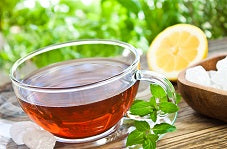Organic Henna- 10 things you didn’t know
 0
0
 2015-10-15
2015-10-15

What are you reminded of when you hear the word ‘Henna’?
Most frequent answers are ‘mehndi’, body colouring and hair dying. However, that is not all, there are not only multiple other uses of Henna, but there are two different variants of Henna. One common Henna is the household Henna that is commonly used for various purpose, another varient is Organic Henna. There are many positive properties of Organic Henna that makes it the best option for treating several ailments. Let us find out all about it and how you too can benefit from it.
About Organic Henna
Organic Henna is 100% natural and unprocessed Henna that is prepared without using any chemical treatment, for this reason the natural healing properties of Henna are preserved. Lawsonia inermis also known as henna is the only species of the genus Lawsonia which is a tree that grows from six to twenty five feet. The leaves of the plant are used in skin and hair colouring since they contain the dye lawsone. The seeds, bark of the plant and leaves are commonly used in ancient medicinal preparations and home remedies.
Did you know that organic henna can be used to treat jaundice, headaches, reduce inflammation, treat puss formation, scabies, mange, correct liver disorder, regularize, blood pressure and do a lot more?
Henna might be new to the western world when it comes to knowing its medicinal properties. However, in the eastern world including Asia, Africa and the Arabic peninsula, it has been used for many centuries to treat many conditions.
- Jaundice
Jaundice is caused by a build-up of a bilirubin in the blood and tissues of the body.It is an infection that affects the liver and bile production. The skin and eyes of the patient suffering from Jaundice turn yellow in color. You can use the healing properties of Henna leaves and seeds to treat this disorder as Henna has antibacterial and antiviral properties.
- Headaches
Crush henna flowers and add vineger to make its paste to be applied on the temples for relieving headache. Vinegar and Henna paste was commonly used as a medicinal preparation in olden days to provide relief from headaches. Additionally, the pleasing aroma of Henna acts as stress-buster.
- Hair fall
Henna is a very effective hair conditioner that adds volume to your hair making it softer and silkier. For this purpose, make a paste of henna and apply generously on your hair.
It restores keratin content in damaged hair and cures split ends. Not only this, henna removes dryness in the scalp and in the hair strands. You can either apply it directly to your hair or use Henna Hair Oil that is an effective treatment for dandruff problems. Not only does it cure dandruff issues, but it also prevents further damage to scalp due to dandruff.
- Wound healing
Henna has anti-inflammatory properties that can be used for treating skin ailments. Prepare It a paste by crushing dried henna leaves with a little bit of water. Apply to burnt or wounded skin for faster healing. Also, henna is effective in treating other diseases such as mange and scabies wherein there is infection and inflammation coupled with accumulation of puss within the skin. Applying henna paste draws out the puss and reduces the inflammation.
- Ulcers and stomach problems
With greater awareness about the healing properties of henna it is being used to treat ulcers in the stomach and intestines.
- Enlarged spleen
In a few people, enlarged spleen is a problem. Since henna is effective in controlling inflammation, it is used to treat enlarged spleen and liver.
- Diarrhoea
Henna is used to treat acute diarrhoea that is caused due to parasites. Infections caused by amoeba in the intestines leading to loose stools can be treated with henna.
- Blood pressure
Henna has hypotensive properties and helps to keep blood pressure under control. This supports the cardiovascular system and removes excess stress being laid on the heart. In order to make use of the blood pressure regulating characteristics of henna, soak four to five henna leaves in drinking water over night. Removing the soaked leaves and drinking the water in the morning will help regularize blood pressure.
- Insomnia
Henna Hair Oil comes handy in treating sleeping disorders such as insomnia and chronic restlessness. Henna is also used in aroma therapy to induce sleep and relax the body. At home, you can use it in your regular relaxing regime by applying henna leaf paste to centre of the sole in your foot and to the centre of the head for about half an hour before removing it.
10. Anti-aging
Last but not the least, Henna also offers anti-aging benefits. It has proven astringent properties. People use henna oil and henna juice to treat wrinkles and fine lines that appear due to aging. Since henna also has antibacterial and antiviral properties, it also helps to protect the skin from infections and further damage.
Organic henna has many uses when it comes to health, skin and hair care. To know more about organic henna and its uses, click here.

 Joybynature.com Team
Joybynature.com Team



